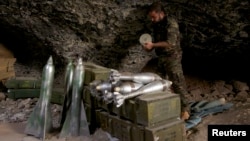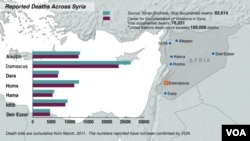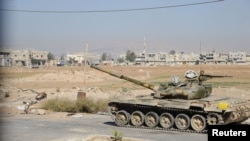The chemical weapons experts tasked with ridding Syria of its arsenal say security is a concern after car bombs and mortar attacks hit near the team's Damascus hotel.
Malik Ellahi, a senior official at the Organization for the Prohibition of Chemical Weapons, told reporters Thursday that so far security issues have not kept inspectors from doing their work.
He said teams have visited 11 sites declared by Syria to be part of its chemical weapons program, and have destroyed equipment at six of them. The inspectors are due to complete that phase of their mission by November 1, and destroy all of Syria's chemical weapons by the middle of next year.
Meanwhile, Syrian Deputy Prime Minister Qadri Jamil said a long-proposed peace conference is scheduled to take place November 23 and November 24.
He said during a news conference in Moscow the talks are as close as ever to happening, and that they would take place in December, if not next month.
"Today we are getting closer to Geneva II than ever before. After our talks in the Russian Foreign Ministry, we agreed on the dates of the conference, or at least on the presumed dates," said Jamil,
The United States and Russia have been trying for months to bring the Syrian government and opposition together to find a negotiated political solution to the crisis. Proposed time frames for the talks have been scrapped repeatedly as disagreements continue over who will take part and under what conditions.
Also Thursday, a Canadian lawyer working for a U.N. peacekeeping mission in Syria has escaped from rebel fighters who held him for eight months. Syrian state television showed Carl Campeau being handed over to the senior U.N. official in Damascus, Yacoub El-Hillo, by deputy Foreign Minister Faisal Mekdad.
Campeau said he managed to escape this week when his captors "forgot to lock the door" of the house where he was being held.
A rebel source said at the time of Campeau's disappearance that he was being held for ransom by a rival brigade of Syrian rebels battling to overthrow President Bashar al-Assad.
Malik Ellahi, a senior official at the Organization for the Prohibition of Chemical Weapons, told reporters Thursday that so far security issues have not kept inspectors from doing their work.
He said teams have visited 11 sites declared by Syria to be part of its chemical weapons program, and have destroyed equipment at six of them. The inspectors are due to complete that phase of their mission by November 1, and destroy all of Syria's chemical weapons by the middle of next year.
Meanwhile, Syrian Deputy Prime Minister Qadri Jamil said a long-proposed peace conference is scheduled to take place November 23 and November 24.
He said during a news conference in Moscow the talks are as close as ever to happening, and that they would take place in December, if not next month.
"Today we are getting closer to Geneva II than ever before. After our talks in the Russian Foreign Ministry, we agreed on the dates of the conference, or at least on the presumed dates," said Jamil,
The United States and Russia have been trying for months to bring the Syrian government and opposition together to find a negotiated political solution to the crisis. Proposed time frames for the talks have been scrapped repeatedly as disagreements continue over who will take part and under what conditions.
Also Thursday, a Canadian lawyer working for a U.N. peacekeeping mission in Syria has escaped from rebel fighters who held him for eight months. Syrian state television showed Carl Campeau being handed over to the senior U.N. official in Damascus, Yacoub El-Hillo, by deputy Foreign Minister Faisal Mekdad.
Campeau said he managed to escape this week when his captors "forgot to lock the door" of the house where he was being held.
A rebel source said at the time of Campeau's disappearance that he was being held for ransom by a rival brigade of Syrian rebels battling to overthrow President Bashar al-Assad.







